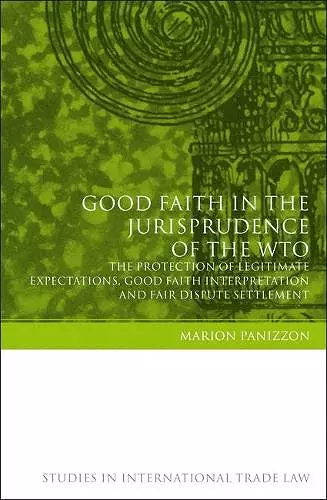Good Faith in the Jurisprudence of the WTO
The Protection of Legitimate Expectations, Good Faith Interpretation and Fair Dispute Settlement
Format:Hardback
Publisher:Bloomsbury Publishing PLC
Published:19th Oct '06
Currently unavailable, and unfortunately no date known when it will be back

What does the concept of good faith express? This book is the first to discuss what good faith means in international trade law. As a reference guide for scholars and practitioners it analyses the case law of WTO dispute settlement practice. The book describes how, why and when the concept of good faith links the WTO Agreements with other public international norms. The concept of good faith appears frequently in treaties and customary rules, but is most often considered a general principle of law. WTO law uses the corrolaries of pacta sunt servanda, the prohibition of abus de droit and the protection of legitimate expectation alongside the principle of good faith. An analysis of GATT 1947 and WTO case law reveals that the function of good faith varies. The Panel reports and the Appellate Body decisions make different use of it. The Appellate Body is prepared to apply the principle to WTO provisions only, while Panels use it more freely and substantively; that is, they apply good faith to fill lacunae in any of the WTO covered agreements. Also, adjudicators use the principle differently, depending on whether it relates to the agreements covered by the WTO or the procedural law of WTO dispute settlement. As it applies to the former, good faith is used to strike a balance between, on the one hand, the obligation to liberalise trade, and on the other hand, the right to invoke an exception to trade liberalisation for the protection of the environment, culture, public morals, human life or health. In this way, good faith safeguards the gains of multilateral trade liberalisation against unlawful interests such as disguised protectionism. The book also introduces the novel field of WTO procedural law governing trade dispute litigation. In the Dispute Settlement Understanding (DSU), good faith appears in the standard of review, rules of evidence and fact-finding, standing, duty of prior consultation, right of establishment of a panel, ex officio investigations, withdrawal of notices of appeal, and the raising of objections. In all these areas it ensures that the rules of dispute resolution are not abused. The Appellate Body has even gone so far as to derive a new standard from the principle of good faith that demands that disputes are settled fairly, promptly...
The question of the role and interpretation of the principle of good faith has not been comprehensively addressed so far. For this reason, Panizzon's analysis is particularly valuable. Panizzon provides a comprehensive analysis of the application of the principle of good faith by the judicial WTO bodies. As the very detailed bibliography ... shows, the author has consulted a variety of sources on interpretation methods, not only referring to international law but also to dispute settlement in general and to WTO law in particular. Panizzon's detailed examination of the role, concepts and interpretation of good faith within the legal framework of the WTO is an interesting and absolutely recommendable contribution to the analyses on the interpretation of WTO law in general and to the discussion on the interpretation of international law principles in that context in particular. Silke Steiner Austrian Review of International European Law Volume 12, 2010
ISBN: 9781841136202
Dimensions: 234mm x 156mm x 34mm
Weight: unknown
434 pages